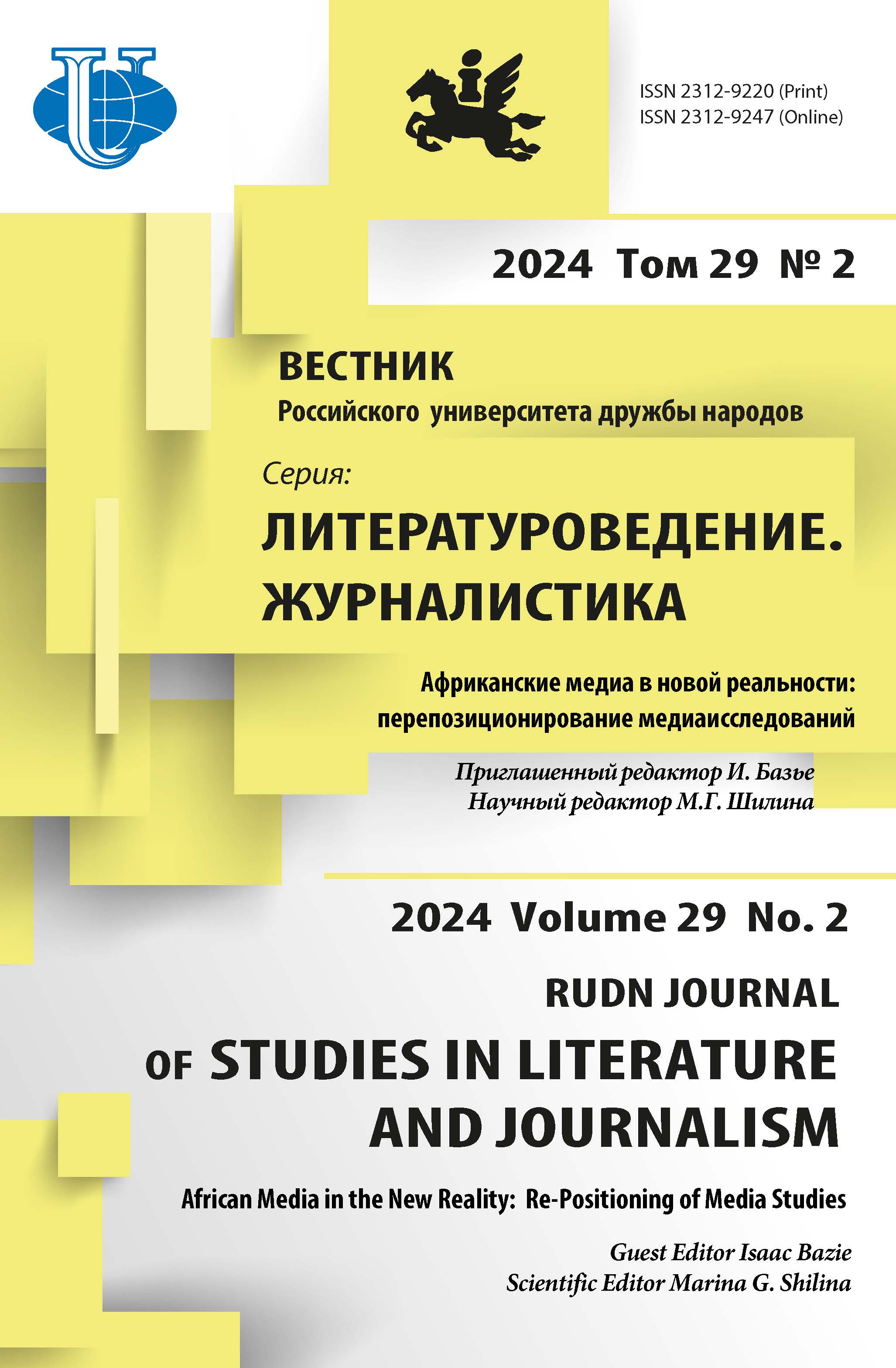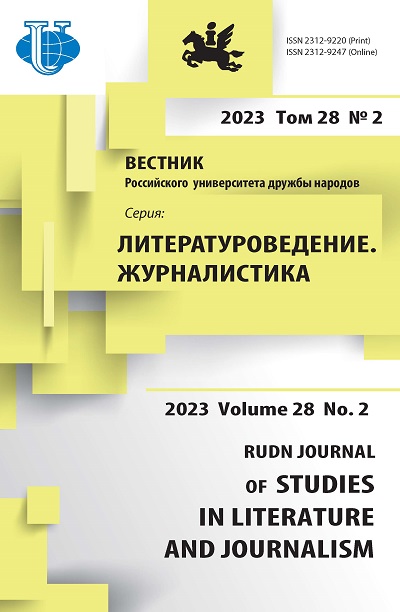The role of university project-based learning technology in shaping a holistic media personality
- Authors: Gavrilov V.V.1
-
Affiliations:
- Surgut State Pedagogical University
- Issue: Vol 28, No 2 (2023)
- Pages: 368-380
- Section: JOURNALISM
- URL: https://journals.rudn.ru/literary-criticism/article/view/35471
- DOI: https://doi.org/10.22363/2312-9220-2023-28-2-368-380
- EDN: https://elibrary.ru/IMIHBJ
Cite item
Full Text
Abstract
The project method in training journalism students is effective and in demand. The author's experience proves it. The main thematic works of domestic and foreign scientists, methodologists, journalists-practitioners were analyzed. The experiment conducted in two groups of future journalists showed that projecting allows the successful development of professional competencies outlined in the Federal State Educational Standard. In doing so, motivation for learning and future activities increases, skills in using digital tools improve, and oratorical abilities improve. The material for the study was the author's teaching work with journalism students of the Faculty of Philology at Surgut State Pedagogical University. The modeling and questioning methods were used. The analysis of the results of the experiment allows to conclude about the effectiveness of the project method of teaching as a means of forming a holistic media personality of a journalism student at university (within the framework of the activity-based approach).
About the authors
Viktor V. Gavrilov
Surgut State Pedagogical University
Author for correspondence.
Email: victorg12@mail.ru
ORCID iD: 0000-0002-1279-3066
Candidate of Pedagogical Sciences, Associate Professor, Associate Professor of the Department of Philological Education and Journalism, Faculty of Philology
10/2 50 let VLKSM St, Surgut, 626417, Russian FederationReferences
- Algavi, L.O., Volkova, I.I., Kadyrova, S.N., & Rastorgueva, N.E. (2021). Youth literary networks as a key to understanding generation Z. Vestnik Moskovskogo universiteta. Seriya 10. Zhurnalistika, (3), 3–21. (In Russ.) https://doi.org/10.30547/vestnik.journ.3.2021.321
- Castels, M. (2000). The information age: Economy, society and culture. Moscow: HSE University. (In Russ.)
- Couldry, N., & Hepp, A. (2016). The mediated construction of reality. Cambridge, Mass.: Polity.
- Dolničar, V., Grošelj, D., Hrast, M.F., Vehovar, V., & Petrovčič, A. (2017). The role of social support networks in proxy internet use from the intergenerational solidarity perspective. Telematics and Informatics, 35(2), 305–317. https://doi.org/10.1016/j.tele.2017.12.005
- Fateeva, I.A. (2007). Media education: Theoretical foundations and implementation practice. Chelyabinsk: Chelyabinsk State University. (In Russ.)
- Fedorov, A.V. (2003). Media education in pedagogical universities. Taganrog: Izd-vo Kuchma Publ. (In Russ.)
- Galperin, H., & Arcidiacono, M. (2019). Learning from or leaning on? The impact of children on Internet use by adults. New Media & Society, 21(2), 483–506. https://doi.org/10.1177/1461444818799996
- Gavrilov, V.V. (2022). On the issue of the development of special competencies of university journalism students in the digital age. Bulletin of Surgut State Pedagogical University, 76(1), 19–28. (In Russ.) https://doi.org/10.26105/SSPU.2022.76.1.002
- Grishchenko, N. (2020). The gap not only closes: Resistance and reverse hifts in the digital divide in Russia. Telecommunications Policy, 44(8). https://doi.org/10.1016/j.telpol.2020.102004
- Grošelj, D., Reisdorf, B.C., & Petrovčič, A. (2019). Obtaining indirect internet access: An examination how reasons for internet non-use relate to proxy internet use. Telecommunications Policy, 43(3), 213–224. https://doi.org/10.1016/j.telpol.2018.07.004
- Gukasova, M.M. (2016). Media personality and personal sphere: The limits of expansion in a socio-cultural situation. Historical and Socio-Educational Thought, 8(3‒1), 101–107. (In Russ.)
- Gukasova, M.M. (2016). Personality – the central concept of personalist philosophy: The media aspect. Bulletin of Pyatigorsk State Linguistic University, (1), 86–90. (In Russ.)
- Hampton, K.N., & Wellman, B. (2018). Lost and saved… again: The moral panic about the loss of community takes hold of social media. Contemporary Sociology. A Journal of Reviews, 47(6), 643–51. https://doi.org/10.1177/0094306118805415
- Isaeva, N.V., Evstratova, L.A., & Leshukov, O.V. (Eds). (2018). Project-based learning: Practices of implementation in universities. Moscow: HSE University. (In Russ.)
- Kirillova, N.B. (2008). Media-culture: Theory, history, practice. Moscow: Kultyra Publ.: Akademicheskii Proekt Publ. (In Russ.)
- Kirillova, N.B. (2014). “Homo medium” as the object and subject of the information age. Bulletin of Chelyabinsk State University, 17(346), 17–23. (In Russ.)
- Kolomiets, V.P. (2020). Mediatization of media. Moscow: MSU. (In Russ.)
- Miasnikova, M.A. (2014). Practical training of art journalists in the framework of professional media education. Pedagogical Education in Russia, (12), 117–121. (In Russ.)
- Munier, E. (1993). Personalism. Moscow: INION Publ. (In Russ.)
- Shesterkina, L.P. (Ed). (2018). Universal Journalism: the Experience of Project-Based Learning. Chelyabinsk: SUSU Publ. (In Russ.)
- Shilina, M.G. (2022). Mediatization in the new normal as transgression: From metaphor to concept? Russian PR: Trends and Drivers: Collection of Scientific Works in Honor of Professor V.N. Stepanov (pp. 68–72). St. Petersburg: UNECON Publ.
- Simons, G. (2018). Brand ISIS: Interactions of the tangible and intangible environments. Journal of Political Marketing, 17(4), 322–353. https://doi.org/10.1080/15377857.2018.1501928
- Simons, G. (2019). Digital communication disrupting hegemonic power in global geopolitics: New media shape new world order. Russia in Global Affairs, 17(2), 108–130. https://doi.org/10.31278/1810-6374-2019-17-2-108-130
- Tulupov, V.V. (2016). On university journalistic education. Izvestia Ural Federal University. Series 1. Problems of Education, Science and Culture, 22(3), 7–13. (In Russ.)
- Urazova, S.L. (2011). Homo informaticus as a personality type. Conflict of the spectacular and the real on the screen. VGIK Vestnik (Journal of Film Arts and Film Studies), (9), 131–139. (In Russ.)
- Urazova, S.L. (2022). Metamorphosis of media system in the perspective of digital acceleration. South Ural State University Bulletin. Social Sciences and Humanities, 22(1), 100–107. https://doi.org/10.14529/ssh220113
- Urazova, S.L., Volkova, I.I., & Pisareva, M.N. (2020). Criteria for the formation of communicative space in the student environment: immersion in creativity. Scientific Notes of Zabaikalsky State University, 15(1), 75–81. (In Russ.)
- Yefanov, A., & Tomin, V. (2022). The significance of protest mood in forming a developed civil society in Russia. Russian Politics, 7(1), 147–165. https://doi.org/10.30965/24518921-00604015


















